Threads and yarn for sock production
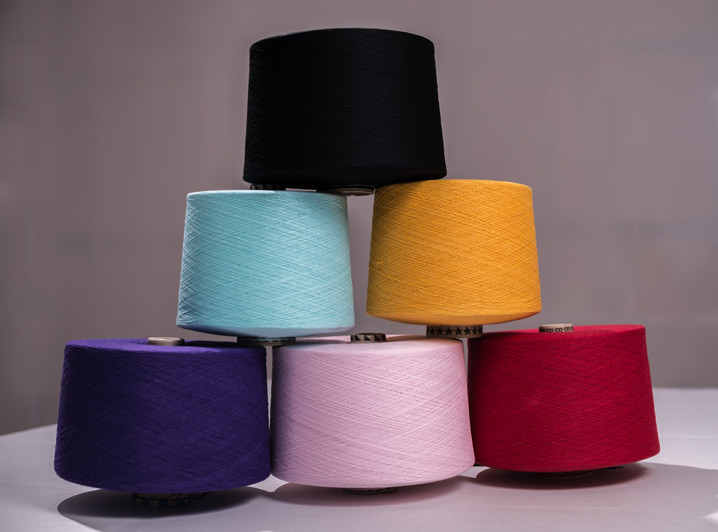
Cotton-polyester – is a yarn obtained by recycling cotton textiles with the subsequent addition of polyester or acrylic fibers.
This yarn is often called blended. Regenerated yarn is in high demand and is used for the production of socks, towels, gloves, fabrics, carpets, blankets, etc.
This yarn is often called blended. Regenerated yarn is in high demand and is used for the production of socks, towels, gloves, fabrics, carpets, blankets, etc.
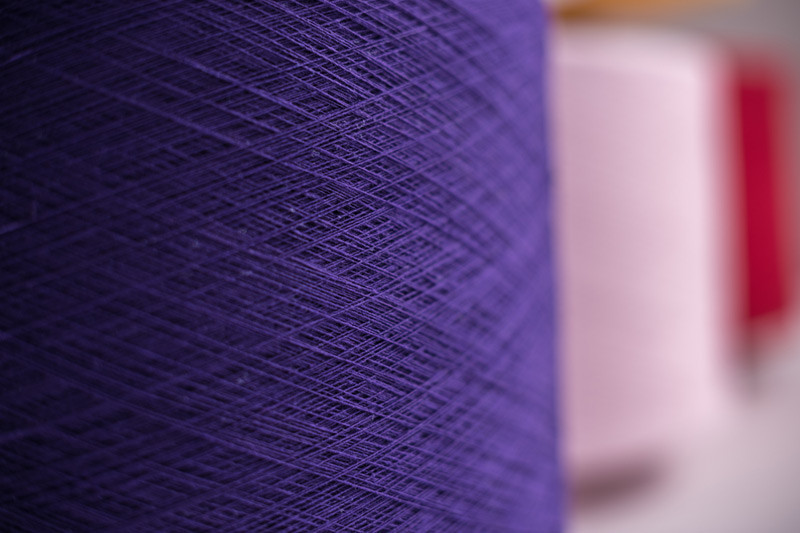
Cotton-acrylic – is a yarn obtained by recycling cotton textiles with the subsequent addition of polyester or acrylic fibers.
This yarn is often called blended. Regenerated yarn is in high demand and is used for the production of socks, towels, gloves, fabrics, carpets, blankets, etc.
This yarn is often called blended. Regenerated yarn is in high demand and is used for the production of socks, towels, gloves, fabrics, carpets, blankets, etc.
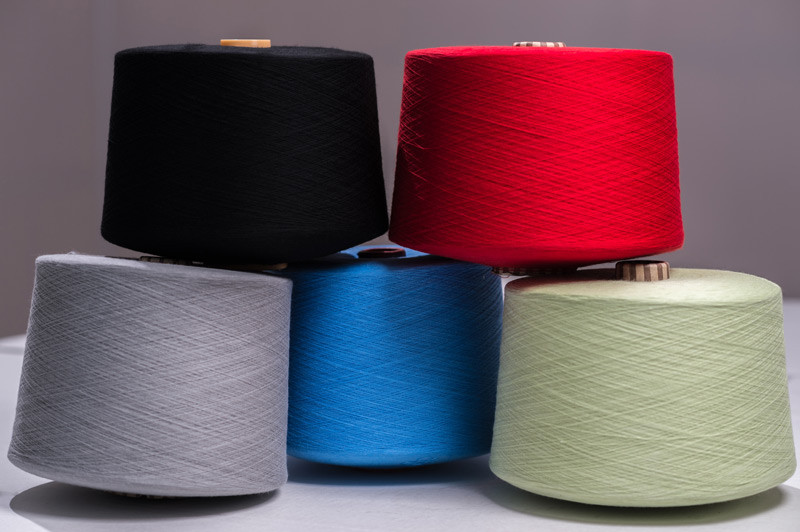
100% cotton yarn is made from cotton fiber. Depending on the method of spinning, there are the following types of yarn:
– combed (combed from long-fiber and is less fluffy, smoother, thinner and tear-resistant);
– carded (derived from cotton fibers of medium length. The main difference from the combed yarn is the greater thickness and less strength).
– combed (combed from long-fiber and is less fluffy, smoother, thinner and tear-resistant);
– carded (derived from cotton fibers of medium length. The main difference from the combed yarn is the greater thickness and less strength).
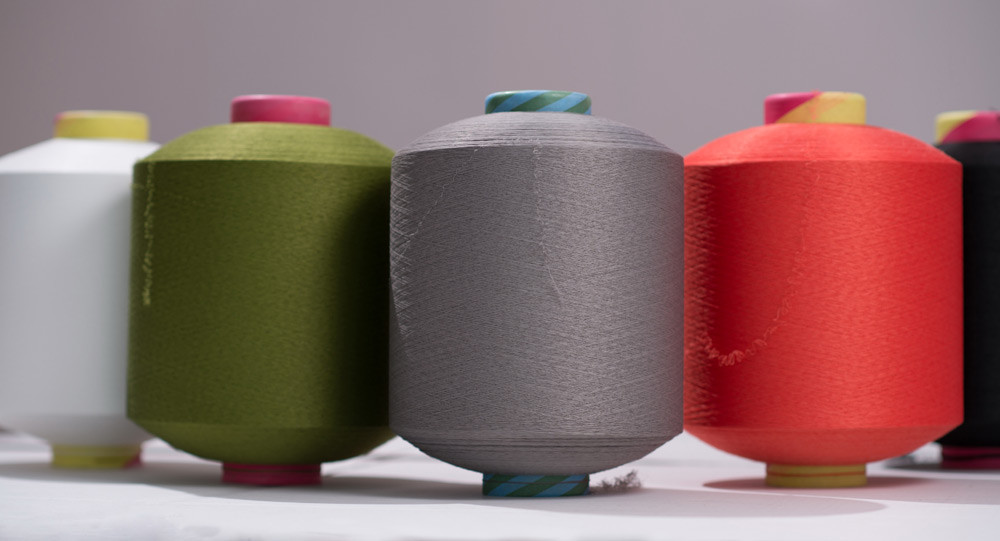
Polyester elastane is pneumatically connected elastomeric thread which consists of 100% polyester and spandex. It's used in sock production to give the product elasticity. Usually added to the product in small quantities (+/- 5%). The most common are spandex connections with a thickness of 20 D made of polyester 75 D, 100 D and 150 D. In addition to black and white threads, we also offer a wide range of colors available and under the order.
We produce pneumatically connected elastomeric threads (spandex) with synthetic textured threads (PES polyester, PP polypropylene, RA 6/66 polyamide).
In our production we use only high-quality elastomeric threads (Creora, Roica, Lycra), first-class polyamide, polyester and polypropylene threads (white, black and colored) from European and Asian manufacturers.
Our equipment allows pneumatically to connect spandex of 15 den, 20 den, 30 den, 40 den with polyester threads 75 den, 100 den, 150 den, with polyamide threads 20 den, 30 den, 40 den, 50 den, 60 den, 70 den, 110 den.
We can also produce pneumatically connected threads to individual order with different technological parameters.
We produce pneumatically connected elastomeric threads (spandex) with synthetic textured threads (PES polyester, PP polypropylene, RA 6/66 polyamide).
In our production we use only high-quality elastomeric threads (Creora, Roica, Lycra), first-class polyamide, polyester and polypropylene threads (white, black and colored) from European and Asian manufacturers.
Our equipment allows pneumatically to connect spandex of 15 den, 20 den, 30 den, 40 den with polyester threads 75 den, 100 den, 150 den, with polyamide threads 20 den, 30 den, 40 den, 50 den, 60 den, 70 den, 110 den.
We can also produce pneumatically connected threads to individual order with different technological parameters.
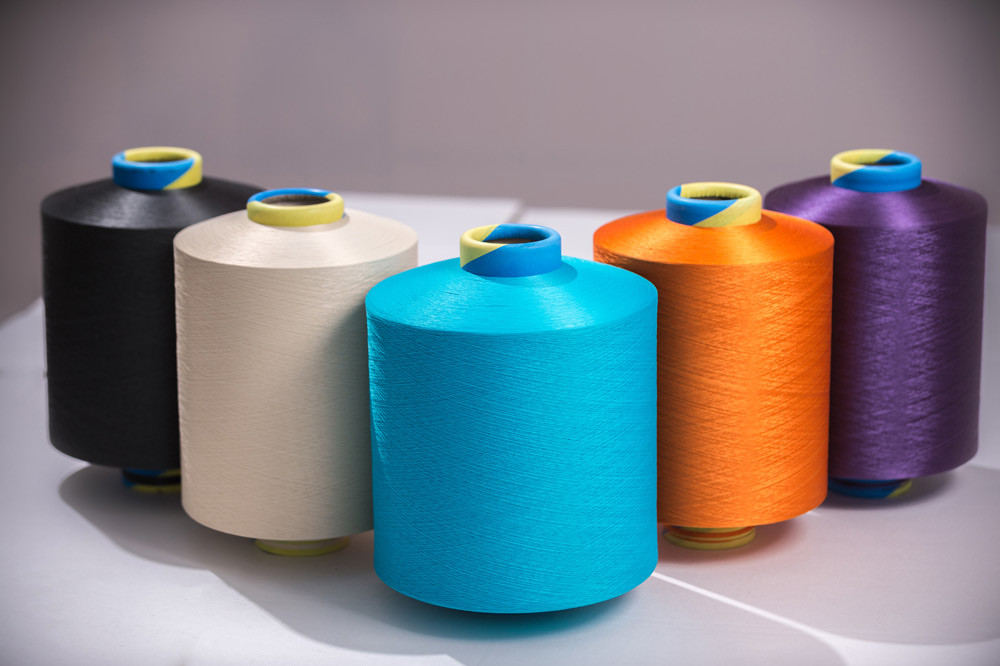
Polyamide elastane is a pneumatically bonded elastomeric thread consisting of 100% polyamide and spandex.
We produce pneumatically connected elastomeric threads (spandex) with synthetic textured threads (PES polyester, PP polypropylene, RA 6/66 polyamide).
In our production we use only high quality elastomeric threads (Creora, Roica, Lycra), first-class polyamide, polyester and polypropylene threads (white, black and colored) from European and Asian manufacturers.
Our equipment allows you to pneumatically connect spandex of 15 den, 20 den, 30 den, 40 den with polyester threads 75 den, 100 den, 150 den, with polyamide threads 20 den, 30 den, 40 den, 50 den, 60 den, 70 den, 110 den.
In the same way we can make pneumoconnected threads under the individual order with various technological parameters.
We produce pneumatically connected elastomeric threads (spandex) with synthetic textured threads (PES polyester, PP polypropylene, RA 6/66 polyamide).
In our production we use only high quality elastomeric threads (Creora, Roica, Lycra), first-class polyamide, polyester and polypropylene threads (white, black and colored) from European and Asian manufacturers.
Our equipment allows you to pneumatically connect spandex of 15 den, 20 den, 30 den, 40 den with polyester threads 75 den, 100 den, 150 den, with polyamide threads 20 den, 30 den, 40 den, 50 den, 60 den, 70 den, 110 den.
In the same way we can make pneumoconnected threads under the individual order with various technological parameters.
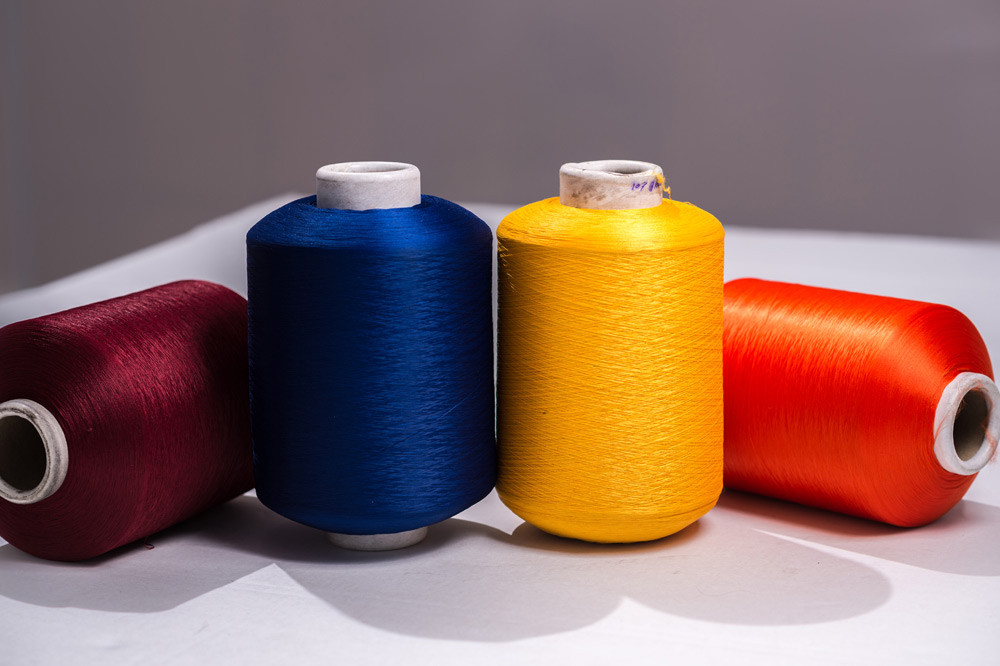
100% polyester is a synthetic polyester fiber. It is added to socks to give the product strength, and also fixes the shape of the sock very well during the steaming process.
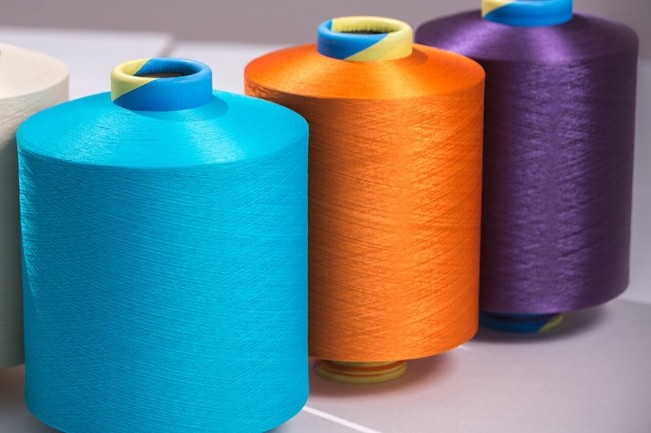
Polyamide threads are characterized by a high level of strength. The fibers of the thread are resistant to abrasion, repeated bending, and retain their shape for a long time.
Polyamide threads differentiate in diameter and linear density, on which the breaking strength depends.
Their main advantage over natural analogues is moisture resistance. Fungus and mold do not form on the fibers and they do not lose their properties when they are wet.
Another advantage of the polyamide yarn is biostability: the fibers do not break down under the influence of Ultraviolet, temperature changes, thermal oxidizers, sea salt.
Physical properties:
– flexibility, elasticity;
– softness;
– homogeneous structure;
– a light weight.
Polyamide threads differentiate in diameter and linear density, on which the breaking strength depends.
Their main advantage over natural analogues is moisture resistance. Fungus and mold do not form on the fibers and they do not lose their properties when they are wet.
Another advantage of the polyamide yarn is biostability: the fibers do not break down under the influence of Ultraviolet, temperature changes, thermal oxidizers, sea salt.
Physical properties:
– flexibility, elasticity;
– softness;
– homogeneous structure;
– a light weight.
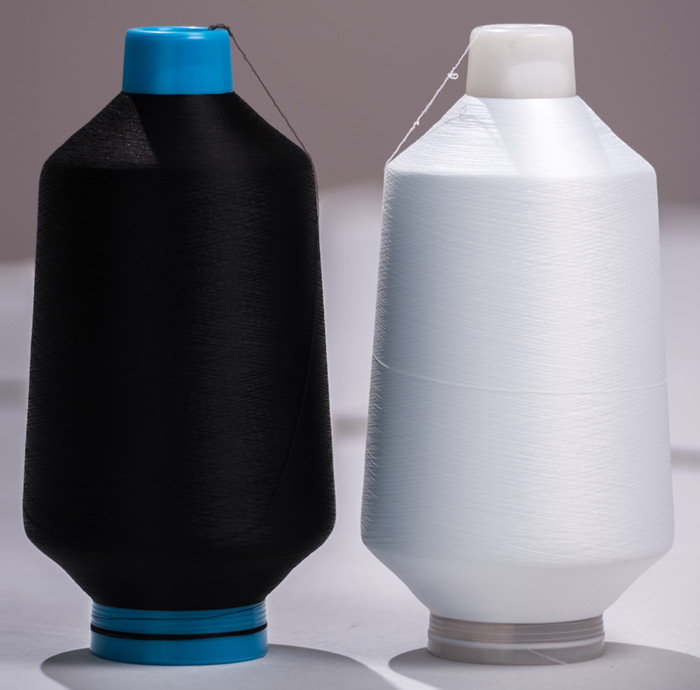
Polyamide threads are characterized by a high level of strength. The fibers of the thread are resistant to abrasion, repeated bending, and retain their shape for a long time.
Polyamide threads differentiate in diameter and linear density, on which the breaking strength depends.
Their main advantage over natural analogues is moisture resistance. Fungus and mold do not form on the fibers and they do not lose their properties when they are wet.
Another advantage of the polyamide yarn is biostability: the fibers do not break down under the influence of Ultraviolet, temperature changes, thermal oxidizers, sea salt.
Physical properties:
– flexibility, elasticity;
– softness;
– homogeneous structure;
– a light weight.
Polyamide threads differentiate in diameter and linear density, on which the breaking strength depends.
Their main advantage over natural analogues is moisture resistance. Fungus and mold do not form on the fibers and they do not lose their properties when they are wet.
Another advantage of the polyamide yarn is biostability: the fibers do not break down under the influence of Ultraviolet, temperature changes, thermal oxidizers, sea salt.
Physical properties:
– flexibility, elasticity;
– softness;
– homogeneous structure;
– a light weight.
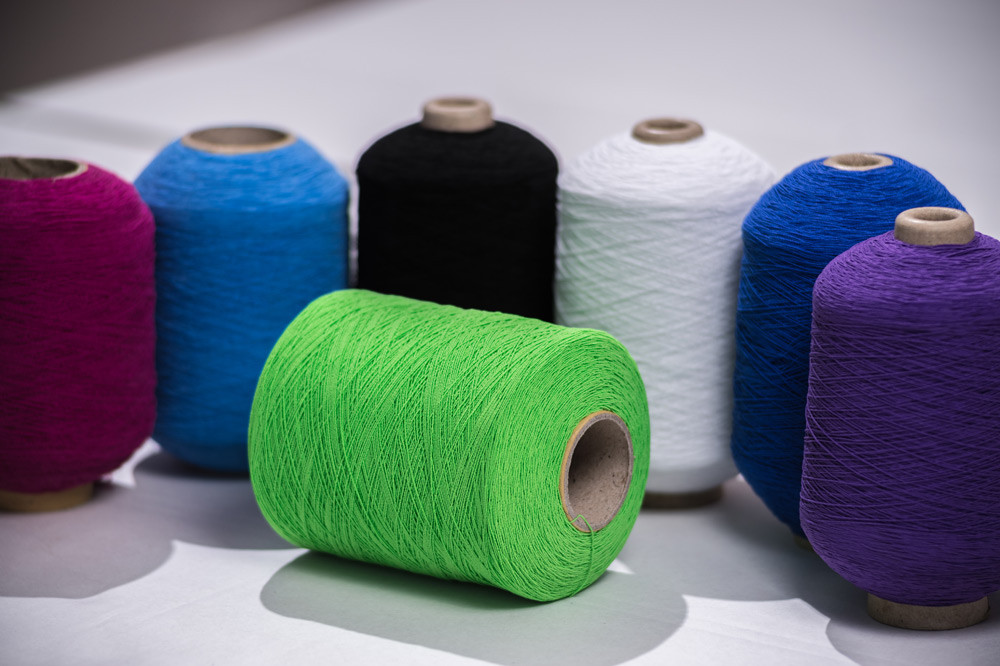
Rubber – is a latex covered yarn with polyester.
The most common latex thicknesses are 100 D, 90 D, 63 D.
Latex is usually braided with 75 D or 100 D polyester.
The most common latex thicknesses are 100 D, 90 D, 63 D.
Latex is usually braided with 75 D or 100 D polyester.
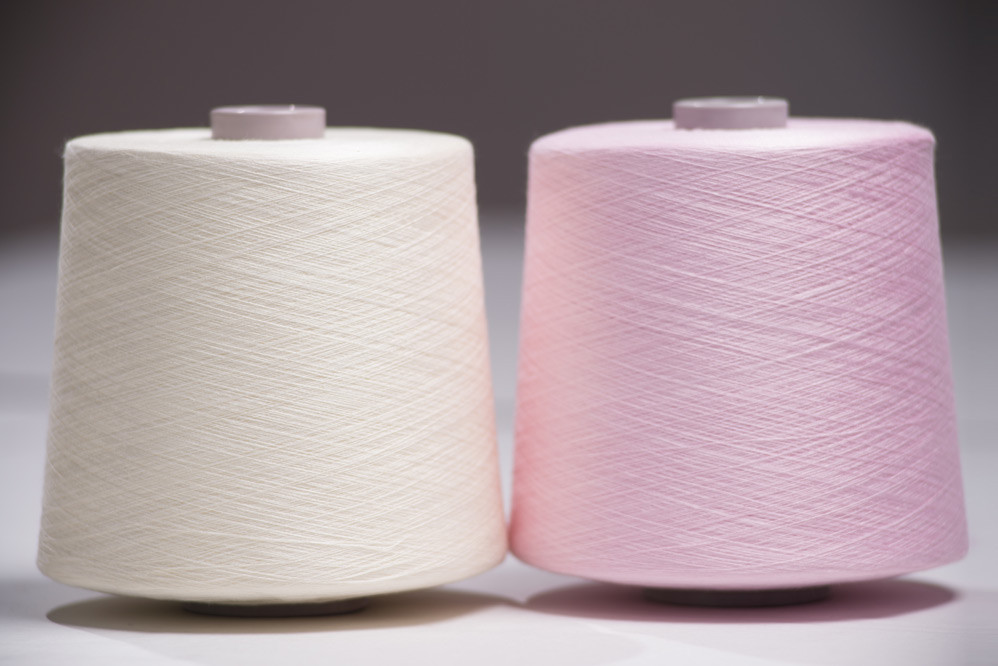
Viscose is an artificial fiber; regenerated cellulose fiber, which is obtained as a result of the viscose process.
From the fibers obtained artificially, twist the threads that form the basis of this pleasant to the touch material.
Viscose thread has the following properties:
– is a reduced cellulose, so the composition is very close to natural plant fibers;
– pleasant to the touch;
– hygroscopic, resistant to most organic solvents;
– able to pass air;
– is not subject to destruction of moths;
– does not accumulate static electricity;
– lighter than cotton.
Disadvantages include relatively low strength, high shrinkage of fabrics (up to 16%), viscose products are easily crumpled and can be destroyed by atmospheric factors as a result of the combined action of water, oxygen, air oxides and ultraviolet radiation. Natural cotton is also exposed to similar effects, but in addition to cellulose, it contains natural antioxidants and protection from sunlight, so cotton is more resistant to the environment.
Manufacturers of yarn and viscose fabrics take into account this feature of pure viscose and introduce additional components: chemical antioxidants and ultraviolet filters, which allows you to extend the life of the fiber and, accordingly, things made of viscose.
From the fibers obtained artificially, twist the threads that form the basis of this pleasant to the touch material.
Viscose thread has the following properties:
– is a reduced cellulose, so the composition is very close to natural plant fibers;
– pleasant to the touch;
– hygroscopic, resistant to most organic solvents;
– able to pass air;
– is not subject to destruction of moths;
– does not accumulate static electricity;
– lighter than cotton.
Disadvantages include relatively low strength, high shrinkage of fabrics (up to 16%), viscose products are easily crumpled and can be destroyed by atmospheric factors as a result of the combined action of water, oxygen, air oxides and ultraviolet radiation. Natural cotton is also exposed to similar effects, but in addition to cellulose, it contains natural antioxidants and protection from sunlight, so cotton is more resistant to the environment.
Manufacturers of yarn and viscose fabrics take into account this feature of pure viscose and introduce additional components: chemical antioxidants and ultraviolet filters, which allows you to extend the life of the fiber and, accordingly, things made of viscose.
Viscose fiber is added to synthetic fibers to improve the sanitary and hygienic properties of products, to cotton (up to 10%) – to reduce the breakage of threads during spinning.
Viscose differs from other types of yarn in smoothness and softness, reminiscent of natural silk. Viscose fabric is very easy to paint in the brightest colors.
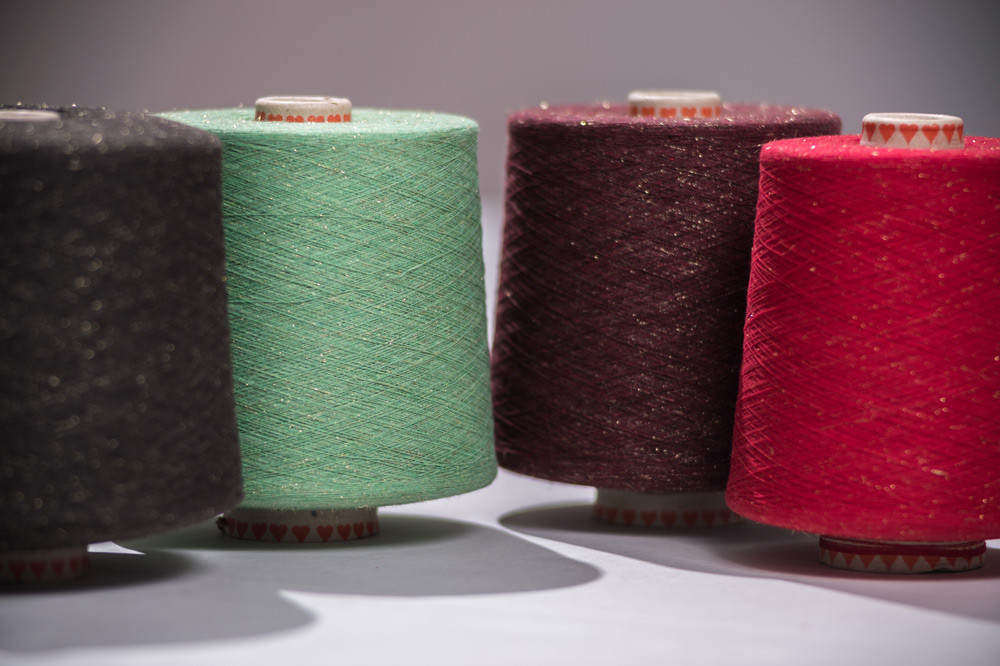
TENSEL is a new generation of natural fibers. This yarn is produced using nanotechnology from wood pulp. From the materials collected during the felling of trees, wood pulp is obtained by mechanical grinding of wood in water. Then the wood mass is pushed through the dies (molds) and under tension form long fibers, which are then dried and produce yarn. The yarn contains 45% viscose and 55% regenerated cotton, thanks to which we get environmentally friendly natural fiber that is perfectly breathable ("breathable"). It should also be noted that tensel yarn products have bacteriostatic properties that inhibit the growth of bacteria, which is suitable for people with sensitive skin. It is made in thickness from NE3/1 (NM 5/1) to NE30/1 (NM 50/1).
NOPE – fantasy yarn with colored dots (NOPE), which are formed by adding colored viscose. Yarn composition 15% viscose and 85% polyester cotton. It is possible to order in thickness from NE3/1 (NM 5/1) to NE24/1 (NM 40/1).
DEGRADE – reconstructed yarn, which is colored in 2-3 colors. And not the whole bobbin is colored, but the thread, so the result is up to 3 colors in one spool. Added to the product in small quantities. It is possible to order in thickness from NE3/1 (NM 5/1) to NE30/1 (NM 50/1).
NOPE – fantasy yarn with colored dots (NOPE), which are formed by adding colored viscose. Yarn composition 15% viscose and 85% polyester cotton. It is possible to order in thickness from NE3/1 (NM 5/1) to NE24/1 (NM 40/1).
DEGRADE – reconstructed yarn, which is colored in 2-3 colors. And not the whole bobbin is colored, but the thread, so the result is up to 3 colors in one spool. Added to the product in small quantities. It is possible to order in thickness from NE3/1 (NM 5/1) to NE30/1 (NM 50/1).

